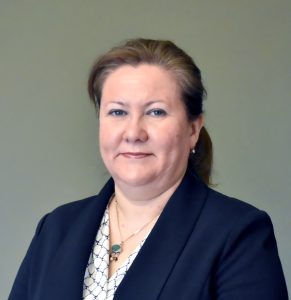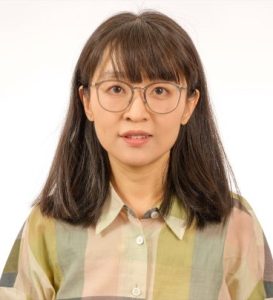
July 7, 2025
Filiz Bunyak Ersoy
Filiz Bunyak Ersoy is an Assistant Professor in the Department of Electrical Engineering and Computer Science at the University of Missouri. She is also a core faculty member of the MU Institute for Data Science and Informatics and the MU Materials Science & Engineering Institute. She earned her B.S. and M.S. degrees in Control and Computer Engineering from Istanbul Technical University, and her Ph.D. in Computer Science from Missouri University of Science and Technology. Dr. Bunyak Ersoy’s research focuses on image processing, computer vision, artificial intelligence, and machine learning, with applications in biomedical image analysis, material science, and visual surveillance.

July 2, 2025
Medeia Csoba DeHass
Medeia Csoba DeHass is an Associate Professor in the Department of Geography at the University of Missouri and a doctoral faculty member at the MU Institute for Data Science and Informatics. She teaches courses on decolonizing research methodologies, digital heritage preservation, research design, and collaborating with Indigenous communities. Dr. Csoba DeHass has been working with Alaska Native communities on a variety of ethnohistorical and ethnographic projects for the past two decades. She is the recipient of an NSF CAREER award supporting her research on Indigenous perspectives and applications of digital 3D technologies in preserving and perpetuating Alaska Native heritage in…

June 24, 2025
Fares Alahdab
Fares Alahdab, MD, MS, MSc, FAHA, is an associate professor of biomedical informatics, biostatistics, epidemiology and cardiology, and the director of graduate studies in health informatics at the University of Missouri School of Medicine. Dr. Alahdab’s clinical and research interests converge at the intersection of cardiovascular medicine, cardiometabolic health, advanced cardiovascular imaging and artificial intelligence. His work incorporates multimodal data sources to assess cardiovascular health and disease. In the research space, Dr. Alahdab applies machine learning and artificial intelligence to build predictive models that evaluate cardiovascular risk and outcomes. A central focus of his work is on explainable AI to…

June 24, 2025
Randi Foraker
Dr. Foraker is Professor and Chair of the Department of Biomedical Informatics, Biostatistics & Medical Epidemiology at the University of Missouri School of Medicine. She is trained as an epidemiologist and holds fellowships in the American Heart Association, American Medical Informatics Association, and the American College of Medical Informatics. Dr. Foraker specializes in the design of population-based studies and the integration of electronic health record data with socioeconomic indicators as well as the use of synthetic data for research. Her recent research has focused on the application of clinical decision support – embedded in the electronic health record – to…

June 23, 2025
Qian Liu
Dr. Liu received her Ph.D. degree of Earth System and Geoinformation Science in May 2022 from George Mason University (GMU). Her research focuses on four aspects: 1. Climate and atmospheric factor detection, segmentation, and retrieval using artificial intelligence (AI) technologies; 2. Spatiotemporal theories and analysis in big earth data; 3. Remote sensing and climate/environmental data record processing and generation; 4. The ability of using the above to solve pressing issues in extreme weather events, climate change and natural disasters.

June 23, 2025
James McClay
Dr. McClay is a professor in the newly organized Biomedical Informatics, Biostatistics, and Medical Epidemiology department at the University of Missouri. He is the Chief Research Informatics Officer for the School of Medicine and the Co-principal investigator for the Greater Plains Collaborative Research Network, a PCORnet Clinical Data Research Network. His research and advocacy focus on standardizing evidence-generation pipelines for learning health systems. Dr. McClay is a long-standing Health Level Seven (HL7) workgroup chair, instructor, and advocate for the HL7 FHIR specifications. He has practiced Emergency Medicine for 30 years and is a Fellow and informatics leader for the American…

April 18, 2025
Ania Rose, PhD, CPA
Professor Rose employs behavioral and psychophysiological methods to research how to improve judgment and decision making in accounting, business, and related fields. She is currently ranked as one of the top two experimental researchers in Accounting Information Systems worldwide. Professor Rose has won teaching awards at several universities for her active and research-based courses, and she has developed executive training for multiple universities and in several countries around the world.

Nov. 18, 2024
Chau Tong
My current research in computational health communication involves applying natural language processing and other computational methods to analyze the vicissitudes of user-generated health content and the diffusion of such content on social media. I direct the Computational Communication and Technology lab at Mizzou; our research team includes undergraduate RAs, graduate RAs, and PhD students. The lab is an interdisciplinary hub for the organization, curation, and processing of digital trace and social media data. Together, we develop and implement rigorous research to produce insights into the digital landscape of health content and estimated impact of such communication flows across news, search…

June 26, 2024
John Robert Bautista
Dr. John Robert Bautista uses a socio-technical strategy to understand the role and impact of technologies (smartphones, social media, blockchain, and artificial intelligence) among health professionals and consumers. As an interdisciplinary researcher, he utilizes concepts from communication, information, psychological, and organizational sciences to understand the use of health information technology based on qualitative and quantitative data. His current research focuses on designing, developing, and deploying AI in health that is effective, efficient, and ethical. His articles appear in Computers in Human Behavior, International Journal of Medical Informatics, JAMIA, New Media & Society, JMIR Public Health and Surveillance and Telematics &…